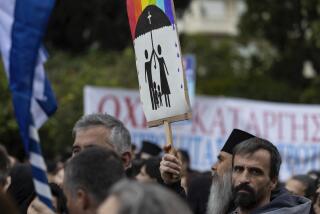SOVIET UNION / LEGALIZING SOCIETY : Rights Are Elusive in the Real World : Panel finds that demolishing the old system can be messy, even dangerous.
- Share via
MOSCOW — When a legal watchdog committee declared Stalin-era residence restrictions unconstitutional last week, it appeared to move the Soviet Union a giant step closer to observing two basic human rights.
With the hated propiska, or residence permit, virtually abolished, Soviet citizens would finally have full rights to live where they want and to choose their place of work.
But it is not so simple. Demolishing the old Soviet system can be messy, even dangerous. In the case of the propiska, ideals on human rights clash with unpleasant reality. To do away with the permits in one blow would bring an uncontrollable flood of humanity into Moscow, Leningrad and other cities already desperately short of housing.
Unwilling to unleash such chaos, the Committee on Constitutional Compliance only used its powers to nullify some of the most odious restrictions, such as that forbidding a wife from living in her husband’s dormitory room, and it called for further changes in the future.
“You cannot infringe on the rights of some in order to defend the rights of others,” said Vadim K. Sobakin, a panel member.
The committee, given many of the powers of a supreme court when it was created last March, is starting to address a long list of human rights and other basic legal questions as the Soviet Union attempts to become a “law-based state.”
Sometimes practical problems, such as the acute housing shortage, make it difficult to enforce full observance of what the committee believes to be the constitution, the law and basic human rights.
But the committee faces even trickier complications of reform: how to keep individual and local rights from running riot and how to maintain respect for the law among politicians who refuse to acknowledge any legitimacy but their own.
“It’s hard to create a law-based society in conditions of legal nihilism,” Boris M. Lazarev, the committee’s deputy chairman, said. “People just say, ‘I don’t like this law, so I won’t obey it.’ ”
The breakdown of the Soviet legal system is one of the great ironies of the Kremlin’s reforms.
President Mikhail S. Gorbachev envisions a “law-based state” respecting individual rights, with the government subject to the constitution and to legislation enacted by elected deputies; no longer will the government be able to act as it pleases on the grounds that it is exercising the “dictatorship of the proletariat.”
Yet the well-intentioned easing of tight central control has led local governments to assert themselves so rebelliously that the country appears to be splintering into ever smaller and smaller pieces.
The central Soviet government complains that its 15 constituent republics are out of control. The republics are struggling with their own subregions demanding sovereignty, and the Moscow City Council complains that district councils will not do what it tells them. Even Gorbachev, whose presidential powers have been expanded steadily over the last year, has seen several of his decrees blithely ignored by local and republic governments citing their sovereign rights.
In a sense, Lazarev said, Soviet citizens have rejected what 18th-Century French philosopher Jean-Jacques Rousseau called the “social contract” under which people yield some rights to live in harmony.
“They have returned to their natural state,” Lazarev said of his countrymen. “That’s anarchy.”
The committee, in its efforts to instill respect for the constitution, is fighting traditional Russian contempt for the law. V. I. Lenin, the Bolshevik revolutionary, complained in 1922 as he struggled to put the Soviet state on a stable basis: “We are living in a sea of lawlessness.”
But the committee has begun to define its powers, stated only broadly in the constitution, with decisions that seek both to enhance human rights and to develop a new legal foundation for the country.
With its decision on the propiska, the committee had a major impact on social policy, a first for the Soviet judiciary which had been a passive instrument of Communist Party policy.
In a decision canceling a law of the Russian Federation barring lawmakers from holding other jobs, the committee acted on a basic constitutional issue; the law could have been used to exclude Communist Party leaders from government bodies.
In annulling a Gorbachev ban on political demonstrations in central Moscow, the committee put limits on presidential authority.
“We just have to repeat like a parrot, ‘You violated the law. You must obey the law,’ ” Lazarev said.
More to Read
Sign up for Essential California
The most important California stories and recommendations in your inbox every morning.
You may occasionally receive promotional content from the Los Angeles Times.












